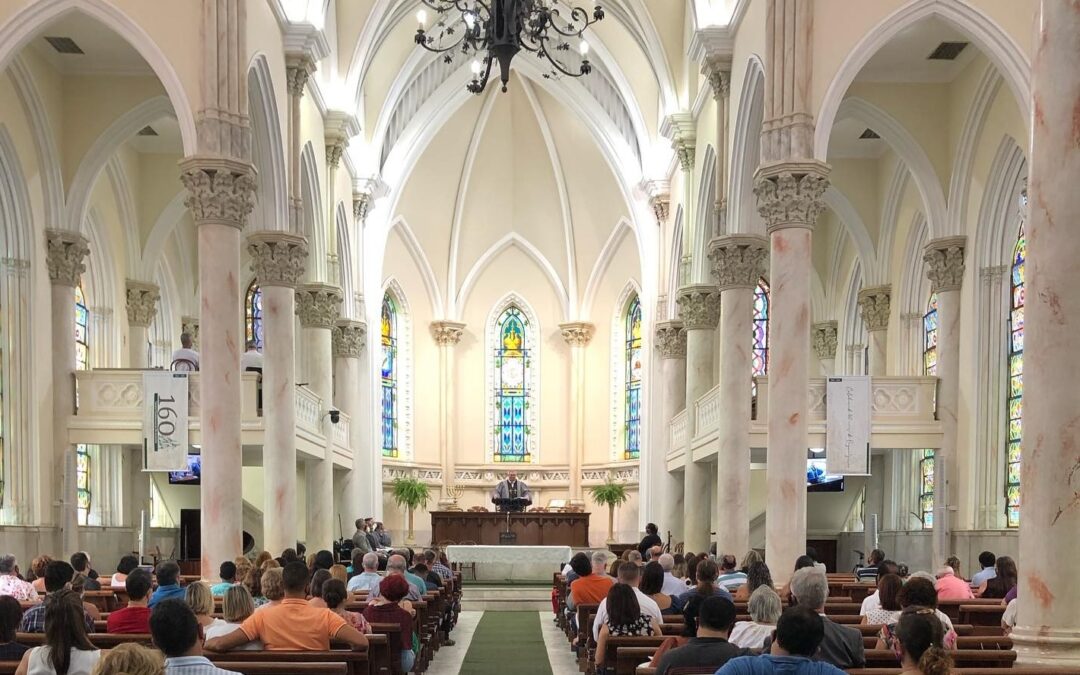Igreja Presbiteriana do Rio de Janeiro, credit: Catedral Presbiteriana do Rio Facebook
Last year, representatives of Brazilian heritage PCA churches and the Presbyterian Church in Brazil (IPB) or, as it is in Portuguese, Igreja Presbiteriana do Brasil, contacted Stated Clerk Bryan Chapell seeking coordination in assisting a growing number of its pastors and church planters in the U.S. Dr. Chapell connected them with MNA, and MNA’s Portuguese Network has since been assisting IPB pastors’ transition into the PCA and strengthening our current PCA Portuguese-speaking pastors’ relationship with the IPB.
There are currently 17 congregations within the PCA led by Brazilian-born Teaching Elders whose entire worship service is conducted in Portuguese. In addition, several Brazilian pastors serve PCA English-speaking congregations.
Since 1992 the PCA has enjoyed a synergistic relationship with the IPB, a large Reformed denomination approximately twice the size of the PCA. The denomination was started in the 19th century and now includes over 5,000 churches. In recent years Bryan Chapell has had the privilege of representing the PCA at their General Assembly, pastors’ conferences, and seminary training.
The initial growth of the Presbyterian church in Brazil was the result of 19th Century American missionary efforts. Now, pastors from Brazil are relocating to America in order to serve the Lord here.
As part of its mission, the Administrative Committee coordinates resources and relationships that help churches carry out Christ’s mission. Given the growing number of Portuguese-speaking elders in our midst, the AC is currently overseeing the translation of the Book of Church Order into the Portuguese language.
“We want to make sure the Portuguese ministers and congregations in our denomination have the resources they need to fully participate in the life of Christ’s body,” says Bryan Chapell. “As they advance the gospel here, we want to support them in every way to promote the unity, purity, and mission of the church.”
Beyond supporting the growth of the Brazilian church in America, the Administrative Committee (AC) also funds and supports the work of the Interchurch Relations Committee (IRC) as it helps the PCA form ties with bodies of believers who are advancing the gospel in other parts of the world.
The IRC is currently chaired by RE Dennis Watts from Jackson, Mississippi. According to Dr. Watts, “Because the Administrative Committee works to fund the Interchurch Relations Committee, the IRC is able, on behalf of the PCA, to reflect and mirror the unity that exists between the Father and the Son through the relationships with those bodies in which the PCA has fraternal relations. Practically, the members of the IRC work to extend the fellowship, influence, and mission of the PCA to the Church at large for the glory of Christ.”
The Brazilian church is just one example of the mutual benefit we derive from our relationships with other branches of Christ’s church. This year, the PCA at its Assembly received reports and delegates from NAPARC denominations like the Orthodox Presbyterian Church, the Reformed Presbyterian Church in North America, and the United Reformed Churches. We were also blessed with representatives from the National Presbyterian Church of Mexico, the Free Church of Scotland, and the IPB of Brazil.
The work of the IRC reflects the principles of PCA founders who believed that the Presbyterian Church in America (PCA) is part of the tree that Jesus planted which exists to provide a refuge for the nations (Matthew 13:32). The PCA is not the tree in its totality. Rather, the PCA is one branch of Christ’s body (BCO 2-2, 38-3) that flourishes to bless God’s people from many backgrounds and nations.
Your gifts to the Administrative Committee enable the PCA to maintain these fraternal relationships with other denominations at home and abroad. Moreover, your gifts also make it possible for the Administrative Committee to translate our constitutional documents into other languages so they can be accessed and utilized to advance presbyterian distinctives among the people groups that are making this nation their home, enabling them to grow with us in worship and mission.
We thank God for the work of other branches of Christ’s church and pray our Savior will continue to use the PCA as well as other branches of his tree to bear much fruit for his kingdom.

